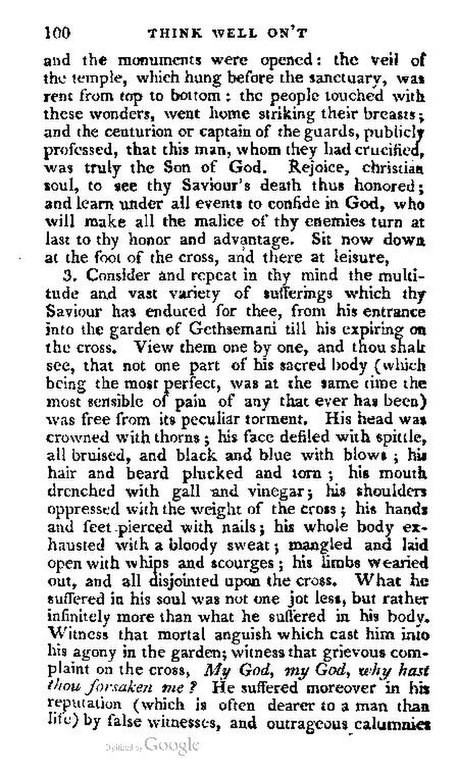and the monuments opened; the veil of the temple, which hung before the sanctuary, was rent from top to bottom; the people, touched by these wonders, went home striking their breasts; and the centurion, or captain of the guards, publicly professed, that this man whom they had crucified, was truly the Son of God. Rejoice, O Christian soul, to see thy Saviour's death thus honoured; and learn under all events to confide in God, who will at last convert the malice of thy enemies to thy honour and advantage. Sit now down at the foot of the cross, and there at leisure meditate.
3. Consider, and repeat in thy mind, the multitude and variety of the sufferings, which thy Saviour has endured for thee, from his entrance into the garden of Gethsemani, till his expiring on the cross. View them one by one, and thou shalt see that not one part of his sacred body (which being the most perfect, was at the same time the most sensible of pain of any that have ever been), was free from its peculiar torment: his head crowned with thorns; his face defiled with spittle, bruised, and swollen black and blue with blows; his hair and beard plucked and torn; his mouth drenched with gall and vinegar; his shoulders oppressed with the weight of the cross; his hands and feet pierced with nails; his whole body exhausted with a bloody sweat; mangled and laid open with whips and scourges; his limbs wearied out, and all disjointed upon the cross. What he suffered in his soul was not one jot less, but rather infinitely more than what he suffered in his body. Witness that mortal anguish which cast him into his agony in the garden; witness that grievous complaint on the cross: My God! my God! why hast thou forsaken me? He suffered moreover in his reputation (which is often dearer to a man than life). by false witnesses, and outrageous calumnies
